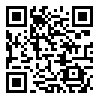مجله رویش روانشناسی از دادن گواهیهای کاغذی معذور است. لطفا تقاضا نکنید. همه گواهی ها در صفحه شخصی کاربران موجود است.
year 11, Issue 7 ( autumn 2022 2022)
Rooyesh 2022, 11(7): 97-108 |
Back to browse issues page
Download citation:
BibTeX | RIS | EndNote | Medlars | ProCite | Reference Manager | RefWorks
Send citation to:



BibTeX | RIS | EndNote | Medlars | ProCite | Reference Manager | RefWorks
Send citation to:
Zargar Nataj S T, Aghajanyhashjin T, Jadidi M. (2022). Explaining the Etructural Model of Academic Procrastination based on Attitudes Toward the Field of Study and Academic Immaturity with the Mediating role of Academic Anxiety. Rooyesh. 11(7), 97-108.
URL: http://frooyesh.ir/article-1-3645-en.html
URL: http://frooyesh.ir/article-1-3645-en.html
1- PhD Student of Counseling, Department of Counseling, Tonekabon Branch, Islamic Azad University, Tonekabon, Iran.
2- Assistant Professor, Department of Psychology, Shahr-e-Qods Branch, Islamic Azad University, Shahr-e-Qods, Iran. ,t.aghajani2014@gmail.com
3- Associate Professor, Department of Psychology, Shahr-e-Qods Branch, Islamic Azad University, Shahr-e-Qods, Iran.
2- Assistant Professor, Department of Psychology, Shahr-e-Qods Branch, Islamic Azad University, Shahr-e-Qods, Iran. ,
3- Associate Professor, Department of Psychology, Shahr-e-Qods Branch, Islamic Azad University, Shahr-e-Qods, Iran.
Abstract: (1988 Views)
The purpose of the current research was to explain the structural model of academic procrastination based on the attitude towards the field of study and academic immaturity with the mediating role of academic anxiety. The research method was applied in terms of purpose and in the form of structural equations. 350 people were selected by random cluster sampling method among all the students of the Noshirvani University of Technology, Babol in 2020-2021. All of them completed the Procrastination Assessment Scale for Students (PASS) by Solomon and Rothblum (1984), the academic anxiety Test (AAT) by Alpert and Haber (1960), the attitude towards the field of study questionnaire (ATFSQ) by Sufo et al. (2012) and the academic immaturity scale (AMS) by Wallerand et al. (1992). Structural equations were used to analyze the data. The results showed that the variables of attitude towards the field of study and academic immaturity had direct and significant effects on academic procrastination and academic anxiety, respectively (p<0.01). Also, academic anxiety had a direct and significant effect on academic procrastination (p<0.01). In addition, academic anxiety had a mediating role for the two variables of attitude towards the field of study and academic immaturity which had an indirect and significant effect on academic procrastination. Finally, it can be said that the research model had a good fit and all three variables of academic anxiety, attitude toward the field of study, and academic immaturity had significant direct and indirect effects on academic procrastination.
Keywords: Academic Anxiety, Academic Procrastination, Academic Immaturity, Attitude toward the Field of Study.
Type of Article: Research |
Subject:
Educational Psychology
Received: 2022/03/1 | Accepted: 2022/09/22 | ePublished: 2022/10/2
Received: 2022/03/1 | Accepted: 2022/09/22 | ePublished: 2022/10/2
Send email to the article author
| Rights and permissions | |
 |
This work is licensed under a Creative Commons Attribution-NonCommercial 4.0 International License. |







